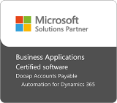
In this blog post, I explore the differences between Dynamics 365 Finance and third-party AP automation tools, focusing on how each handles various invoice types, particularly recurring invoices. You'll gain insights into the limitations of D365 Finance and discover how dedicated AP automation solutions can enhance efficiency and agility in managing your accounts payable processes.
Understanding AP Functionalities: D365 Finance vs. Third-Party Automation
The important thing to understand when comparing the Accounts Payable functionalities of D365 Finance with third-party AP automation is the difference in how the processes are built. The D365 process is pretty much set – it relies on the assumption that you have Purchase Orders for all invoices. But that is not always the case. There are many use cases where Purchase Order matching overly complicates things and leaves users just annoyed.
The Reality of Non-PO Invoices
Having all invoices as preapproved Purchase Orders is of course technically possible, but in practice, there will always be exceptions. In some situations, the dreaded non-PO invoice might even be the best practice option. Furthermore, there should always be a balance between the necessary corporate controls and the agility of operations. Controls should not be there to make our lives miserable, and from an operational perspective, sometimes agility should override rigid control. Purchase orders are undoubtedly the best option for your core functions, but what about invoices outside the actual procurement process? Could we be more agile in how we process them?
Challenges with Diverse Invoice Types
If your AP process has to support many different kinds of “invoice types”, such as rents and utilities, etc., the D365 Purchase Order process does not usually work. The concept of recurring invoices is a good example of an invoice type that often lacks a suitable process. These invoices are typically utility invoices or other administrative costs like electricity, professional services, legal fees, and so on. In some cases, you don’t even receive a monthly invoice, but you must create the invoice yourself based on the agreement. Typically, these are poorly “automated” in D365 by using blanket orders or getting the coding with a periodical journal, but to be honest, that is not true automation. Blanket orders end up causing more hassle because they are not a solution to the problem but a bad workaround.
Impact of Non-Automated Administrative Costs
Administrative costs typically form between 10 to 30 percent of all invoices in a company. It is a substantial invoice category that we are not automating if we are using only the standard D365 solution. AP automation tools usually offer a solution to recurring invoices. It is a way to automate and manage recurring invoices as an entity. These tools can automate any invoice that is recurring periodically or if you need to self-bill for example a monthly rent invoice automatically. Most importantly, you can log the approval for the automated process and set a specific coding or workflow.
Recurring Invoice Automation with Dooap
With recurring invoice automation, Dooap users can use Machine Learning to recognize the recurring patterns, automating even more invoices.








